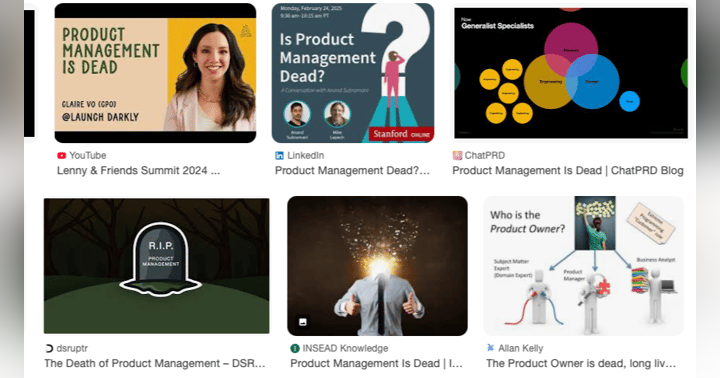On executive recruiting - A conversation with Chris Johnson, Founder Artisanal Talent

Chris Johnson is CEO & founder of Artisanal Talent , a highly specialized boutique executive search firm known for building some of tech’s most talented executive teams. Chris leads the Product and Engineering Leaders Practice, and is one of the most highly sought-after search consultants in the field for these critical roles at tier-1, high profile, VC backed and public companies. Over the past few years, Chris has completed Product and Engineering searches for Rippling, Notion, Rubrik, Airtable, ServiceNow, Databricks, Figma, UiPath, Confluent, Mulesoft, Starburst, GitLab, Splunk, Harness, New Relic, Elastic, dbt Labs, MessageBird, Postman, Coalition, Loom, Pendo, Procore, etc.
Chris, right off the bat, I want to ask you about the Chief Product Officer role that Slack is hiring for. If this were your search, how would you run the process?
Chris: That's a great question. If I were leading this search, which I am not, I would approach it in a couple of ways. One is figuring out, what are the must-haves vs nice-to-haves. You can read the job spec. A spec is a spec for the most part. What are they looking for? What are the outcomes they need to drive with this hire?
Slack is ubiquitous. My first approach would be really centered around what do we need to do to continue to innovate and be different. What does that look like?
Whoever gets this job will have operated at a very large scale - stakeholder management, large company, integrations to all the other parts of Salesforce - someone who has, for the lack of a better phrase, done the political song and dance in a large company. Otherwise they would get very frustrated very quickly.
The next piece that is going to be a critical element is innovation. It won't just be the person who has run large scale for large scale sake. They are going to have to know how to build a product that people love. Who does that better than anyone else? Consumer people. If you've only worked at Cisco and HP, you are not going to qualify.
So my thesis is that this person is going to come from a FAANG company, Microsoft, Google, in one of those collaborative suites type of product. If you're working on half of Google Suite, and you can go work on all of Slack, that's a pretty good gig.
At that level, people are fairly accomplished. They have a track record of success. They have demonstrated the ability to build successful products, scale businesses, inspire large teams. At that level, how do people stand out?
Chris: That's a great question. The first part is an intangible, but it's fit. There are different styles, different approaches, different communication methods. There are technical introverts who are geniuses, who can manage at scale, and there are people who could have been a Head of Sales somewhere because they're so good at communicating, and savvy and can carry a room. So fit is something that is heightened because everyone that team meets is likely going to check the boxes of on-paper experience.
So then the question is really what would you do with Slack? Who has that innovative spark that they're going to crisply articulate? Someone will standout in the mix. They thought outside the box. Someone is going to be different in how they approach what they would do with Slack.
So there's an element of projecting yourself in that role for the next year and say how would Slack be different with them there.
Chris: I tell people there has to be a moment during the course of the search where you put yourself in the shoes of the job. You have to have a point of view and even if it's different, you're putting yourself out there to make a bold bet on what we can do. It may work, it may not work. The people who lean into a process and who put their point of view into the conversation tend to have a bigger opportunity to succeed.
Let's switch to the candidate side of the search process. You mentioned fit. How do you assess if the candidate is going to fit the company team and environment?
Chris: It's a very hard one. I will never hold a candidate back from being an introduced candidate, unless it's glaring. If the first couple of questions they ask are about work life balance and if they have to go into the office three days a week, then the person is not the right fit if the company says we're five days a week and we work on weekends because we're grinding it out.
Then there are things like how did decisions get made inside the company, is it top down, is it by consensus, how do things happen within that culture. If you're working at an Israeli security company, you can figure out how they are as a company, how the execs operate. Then if you meet the candidate, you can get into some of the nuances. Have you worked in this type of culture before? How do you take feedback? How do you give feedback?
I spell it out for the client too. I'm not the one making this hire. You've been running this company for five years. I've known you for five months. I'm going to let you make the call, but here are my thoughts, my reservations. They might be a little bit title-motivated and you guys don't give out C-level titles. I feel that out by being able to push on those softer elements.
What's your advice for how candidates can craft a narrative of who they are and the experience they've had?
Chris: Impact is the biggest piece. Clear and concise ability to describe the impact you've had. What did the product and team look like when you got there, what did it look like when you left, and why did you leave. If you can do that in each one of the last two or three relevant companies and roles, you've got a leg up.
One of the other things I tell people, and it may seem pretty obvious, don't talk for 25 minutes in a row. It's amazing how many times that's the feedback I get when I get a call from the CEO. The person did not do well, they weren't self-aware to stop and ask if this is helpful.
The articulation of what it is that you've done, who you've worked for, what you've learned, what you wish you would have done differently, being self-aware to understand the things that you may have not done well, that's how I generally talk with people about their narrative.
There's nothing worse than getting the phone call that said the person did not use the word we one time, and it was I did this, I did that.
And if you ask good questions to the executive recruiter about why this company is hiring a Head of Product right now, what inflection point are they at, and loop that back into the narrative when you are talking with the actual client, that's pretty powerful.
What's your advice about how people should talk about the weak spots on their resume?
Chris: With clarity, not sugarcoating it. To say that a different way, be able to own mistakes. There are different scenarios in which things did not work. If it is a company thing, be very careful how you word it, meaning - I got into company X after I spent five years building this business. I had the opportunity to be Chief Product Officer. I got in there and wow, what a dumpster fire. CEO had no clue what they were doing. The board was a mess.Red flags right there.
Nobody needs to hear you trash a previous employer. Say that in a different way. You know what, I rushed my decision. I didn't do due diligence. I didn't talk to enough former executives that I should have seen churned out of there. I met four execs. I should have asked to meet seven. I only met the four they picked.
Understanding that this is on you too, because you made the decision to ultimately join. I joined the business that I was supposed to run, and it got defunded. You can't control that. But if you say, it wasn't the right company for me, you keep it so vague, someone is going to figure out why it did not work, whether it was a company thing, or a business outcome thing.
You should not be shy to talk about the mistakes and failures. It shows more about who you are as a human and an exec, and your ability to be self-reflective.
Check out the full conversation on YouTube, or listen on Apple Podcasts and Spotify where Chris shares more stories and insights about:
- Hiring trends
- Being a wartime or peacetime leader
- How to balance the use of "I" vs "We" in interviews
- Working as a CPO for a strong founder
- Staying connected with executive recruiters
- How recruiters think about exceptions to the job spec
- Playing career chess vs checkers





